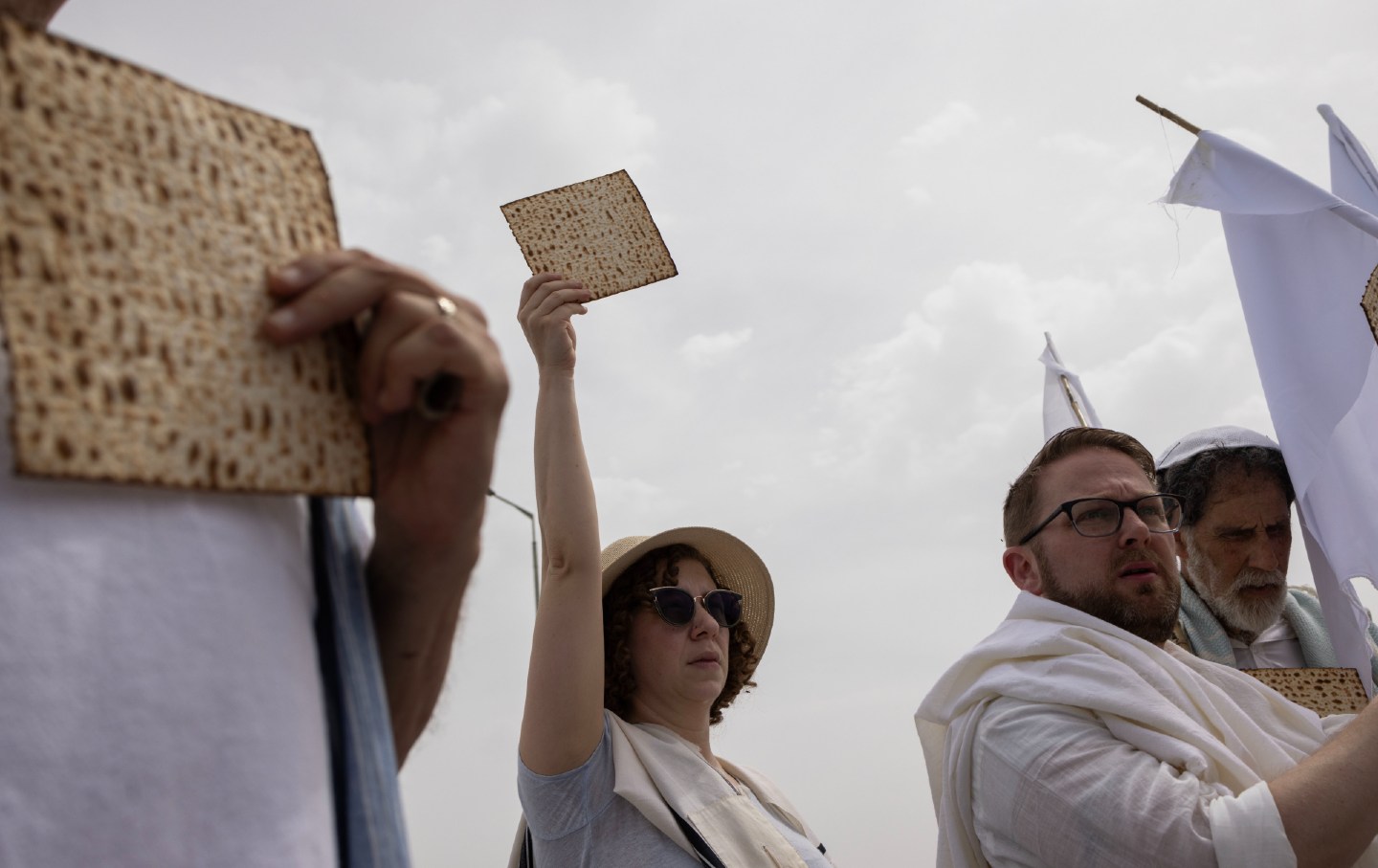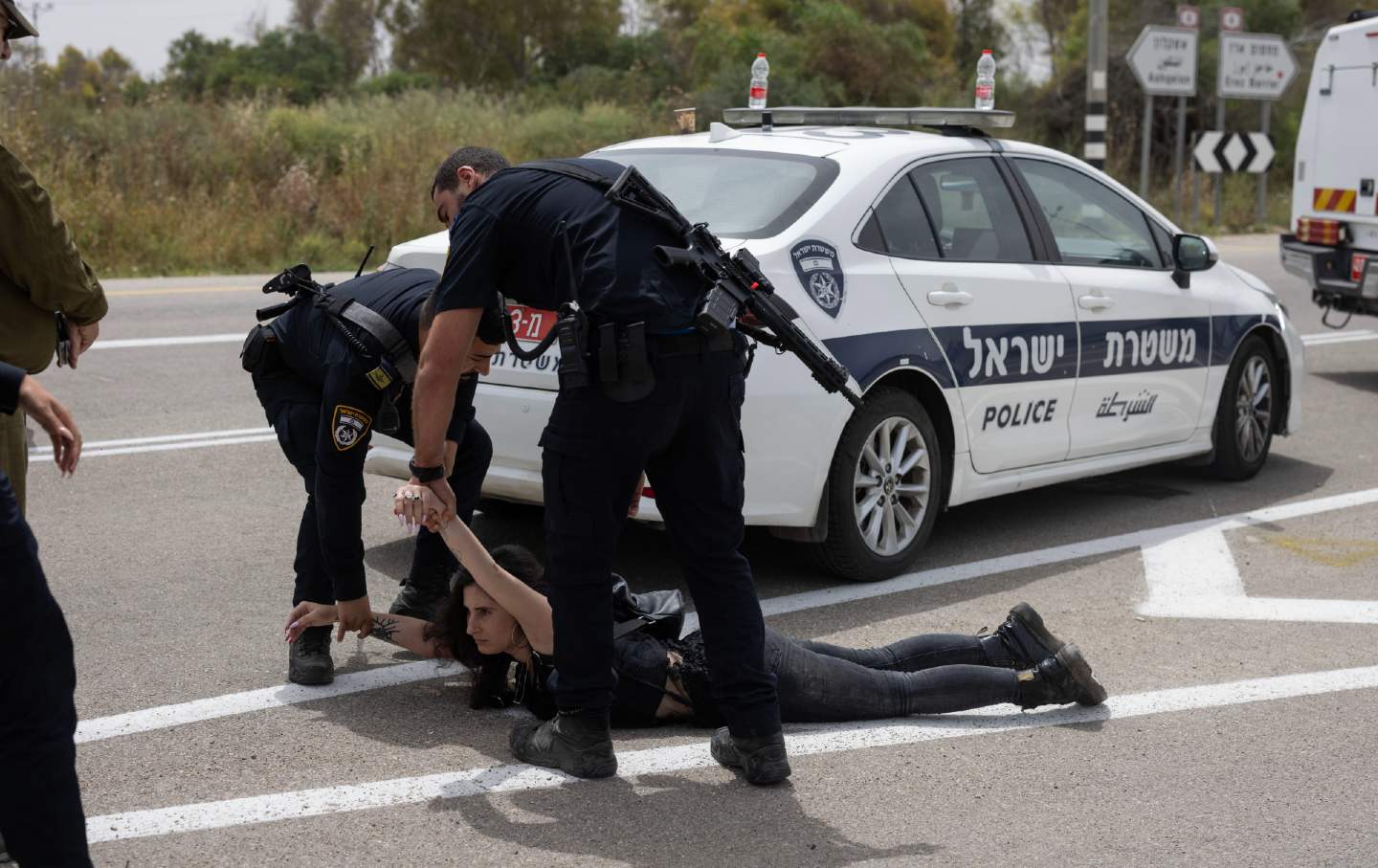We Tried to Bring Food into Gaza—but Israel Blocked and Arrested Us
PALESTINE ISRAEL GAZA GENOCIDE, 13 May 2024
Brant Rosen | The Nation - TRANSCEND Media Service

A delegation of rabbis from the United States and Israel march toward the Erez/Beit Hanoun Crossing at the northern tip of the Gaza Strip on 26 Apr 2024.
As Israel continues to starve the people of Gaza, a delegation of rabbis marched toward the Erez Crossing during Passover carrying sacks of flour and demanding a cease-fire.
6 May 2024 – In 2017, I spent several days in Gaza as a staff person for the American Friends Service Committee. Although I took away many powerful and vivid memories from that trip, some of the most indelible involved the delicious food that was continuously served to us by our Gazan hosts. Gazans are famously proud of their cuisine, and rightfully so, as it provides them with a palpable connection to Palestinian history and life outside that small 140 square-mile strip—to communities in Palestine where their ancestors used to live. As journalist Laila El-Haddad has observed, Gazan food is “a sort of treasure map to a largely invisible, or invisibilized, world of Palestinian history going back well before the 1948 Nakba.”
During the course of our visit, Ali, a member of the AFSC Gaza staff, mentioned more than once that Gazan knafeh (a traditional Arabic dessert) was by far the best in Palestine. When our staff group gathered at a restaurant in Gaza City for our final meal, Ali was chagrined to learn that there was no more knafeh left in the kitchen. Determined, he got up, ran down the street to another restaurant, and returned with a huge round plate of the sticky, golden pastry for our table. It was indeed more delicious than any knafeh I have eaten before or since.
I’ve recalled that sweet memory often over the past seven years. When I think of it now, however, I find its sweetness has curdled into horror. As far back as December, human rights agencies determined that Israel “was using starvation as a weapon of war.” According to the World Food Program, Gaza’s food system was on the brink of collapse and the population was facing a “high risk of famine.”
This past March, the mainstream media published shocking, heartbreaking pictures of Yazan Kafarneh, a 10-year-old Gazan boy reduced to skin and bones from starvation. To date, it has been estimated that 28 children have died of malnutrition and starvation in northern Gaza. By all accounts, starvation in the besieged Strip has now reached “catastrophic” proportions. Palestinians in Gaza are now forced to eat grass just to survive.
As a congregational rabbi, I spoke with many people who told me that they were not sure how—or even if—they would celebrate Passover this year. With the genocide and forced starvation of the people of Gaza deepening with no end in sight, they said it felt beyond challenging to celebrate a festival of Jewish liberation. To make the moral dissonance even more dissonant, many in the Jewish communal establishment framed the meaning of this year’s Passover exclusively around the plight of the Israeli hostages in Gaza and the call for their liberation from Hamas, with nary a mention of the 35,000 Gazans who have been killed by Israel’s genocidal vengeance.
More than once I was asked, “How can I partake of this festive meal while Israel has been starving Palestinians in the name of the Jewish people? How can I read about Pharaoh’s oppression of Israelite children when I’ve just read the latest death count of Palestinian children dying increasingly things from forced starvation?”
As a political-spiritual response to this unprecedented Passover moment, Rabbis for Ceasefire—a group of rabbis and rabbinical students who came together last October to demand an end to the violence—began to organize an action at the Gaza border. Motivated by Passover’s central imperative—“All who are hungry come and eat!”—our mission was to bring food supplies to the Erez Crossing and demand that Israel allow us to pass through. Our action included 10 American rabbis, writer Ayelet Waldman, and 30 Israeli activists—including Israeli rabbis—who have been tirelessly protesting both at the Gaza border and organizing protect presence for West Bank communities targeted by settler violence.
On April 26, we gathered at a preplanned meetup location, with a truck filled with half a ton of flour. We each shouldered bags of rice and, carrying banners and flags, marched in the direction of the Erez Crossing. The Israeli police quickly drove up to intercept us. During that initial stand-off, several of us offered statements.
I began with an opening prayer, an adaptation of the “Magid” section of the Passover Haggadah, when Jews retell the story of the Exodus: “This is the bread of affliction, the bread and food systemically, cruelly denied the people of Gaza. Let all who are hungry come and eat. Let all who are oppressed be liberated this Pesach. Now, we are here—tomorrow, let there be bread for Gaza. Now, we are here—next year, may there be liberation from the river to the sea!”
Other speakers included Israeli Rabbi Avi Dabush of Rabbis for Human Rights, a resident and survivor of a kibbutz that was attacked on October 7, and Noam Shuster-Eliassi, a well-known Israeli activist, writer, and comedian. When our program was over, we pushed forward toward the border. When the soldiers violently attempted to break us up, several of us sat down in the road. During the course of the protest seven of our group—four Americans and three Israelis—were arrested.

All of the arrested were fully prepared for this eventuality (the Israelis were veterans at protest arrests and had briefed us on protocol). They were taken to two detention centers and interrogated for eight to nine hours. The Americans were told, bluntly, that they were being held for “attempting to bring food into Gaza.” All the arrested were released that evening. Thankfully, the food we attempted to bring into Gaza was not confiscated, so we were able to donate it to Masafer Yatta—a community in the South Hebron Hills where almost 3,000 residents are resisting the daily threat of demolitions, evictions, and dispossession.
Now that many of us are back in the United States, we are not ready to stop sounding the alarm about the atrocities Israeli is committing in Gaza, not ready to stop pressing for a cease-fire and the flow of food once again into Gaza. As it is, nearly 2.2 million Palestinians in Gaza currently face mass starvation and encroaching famine. Hundreds of trucks filled with humanitarian goods have been sitting idle on roads leading into the Rafah crossing on the border with Egypt, blocked from entering Gaza by a draconian inspection process that severely limits the number of trucks that can pass through. Inside Gaza, the Israeli military has attacked efforts to distribute aid with tragic results. According to the United Nations, the Israeli military has killed 196 relief workers, while soldiers have shot and killed hundreds of Gazans venturing out to seek food.
Amid all this horror, the one agency that has the capacity and infrastructure to effectively distribute relief to the people of Gaza, the United Nations Relief and Works Agency (UNRWA), has been defunded by the Biden administration. This past January, the Israeli government leveled the still-unsubstantiated claim that 12 UNRWA employees were involved in Hamas’s October 7 attacks in Israel. Though UNRWA immediately fired the employees in question and launched an investigation, the US withdrew its financial support of the agency, which was founded in 1949 to provide support to the hundreds of thousands of refugees created by the establishment of the state of Israel.
In its spending bill this past March, the US government extended its ban on UNRWA funding for a year. Though the agency reports it has sufficient funds to operate until the end of May, its ability to provide services in Gaza has been dangerously hampered. Last month, Israel announced that it would no longer approve UNRWA food convoys to the north of Gaza, where famine is the most imminent. According to a recent report, the agency noted that “a total of 420 food trucks were denied or impeded by Israeli authorities [inMarch].” It warned: “Gaza is on the brink of famine, with 1.1 million people—half of its population—experiencing catastrophic food insecurity due to the intense conflict and severe restrictions on humanitarian access.”
Most ominously, Israel continues to amplify its threats to invade Rafah, where some 1.4 million people are currently living, many of them refugees from elsewhere in Gaza. An invasion would almost certainly result in massive human suffering and tragedy.

And yet, in the wake our action on the border, I continue to hold out hope. It is clear to me that our border protest was part of something much larger: the dramatic rise in Palestine solidarity increasing around the world, including the growing student protest movement on campuses across the United States. And I am more convinced than ever that Israel cannot, try as it might, starve or bomb the Palestinian people from existence, nor can it destroy the love for their culture that is so deeply rooted in their homeland: In the words of El-Haddad: “Lately, I’ve been thinking about what I would go back to, and what I would find, if I returned to Gaza. Most of the landmarks have been destroyed. Gone too are many of the people I cherished. But…it feels like I am the torchbearer now, the family’s keeper of treasured recipes. Like Um Hani [Leila’s aunt, who was killed in an Israeli air strike], I will cook and I will teach, connecting the next generation of Palestinians to our homeland.”
______________________________________________
Brant Rosen is the founding rabbi of the synagogue Tzedek Chicago and the cofounder of the Jewish Voice for Peace Rabbinical Council. From 2014 to 2019 he served as the midwestern director of the American Friends Service Committee.
Go to Original – thenation.com
Tags: Crimes against Humanity, Gaza, Genocide, Hunger, Israel, Official Lies and Narratives, Palestine, Right to Food, Rogue states, War crimes
Join the BDS-BOYCOTT, DIVESTMENT, SANCTIONS campaign to protest the Israeli barbaric siege of Gaza, illegal occupation of the Palestine nation’s territory, the apartheid wall, its inhuman and degrading treatment of the Palestinian people, and the more than 7,000 Palestinian men, women, elderly and children arbitrarily locked up in Israeli prisons.
DON’T BUY PRODUCTS WHOSE BARCODE STARTS WITH 729, which indicates that it is produced in Israel. DO YOUR PART! MAKE A DIFFERENCE!
7 2 9: BOYCOTT FOR JUSTICE!
DISCLAIMER: The statements, views and opinions expressed in pieces republished here are solely those of the authors and do not necessarily represent those of TMS. In accordance with title 17 U.S.C. section 107, this material is distributed without profit to those who have expressed a prior interest in receiving the included information for research and educational purposes. TMS has no affiliation whatsoever with the originator of this article nor is TMS endorsed or sponsored by the originator. “GO TO ORIGINAL” links are provided as a convenience to our readers and allow for verification of authenticity. However, as originating pages are often updated by their originating host sites, the versions posted may not match the versions our readers view when clicking the “GO TO ORIGINAL” links. This site contains copyrighted material the use of which has not always been specifically authorized by the copyright owner. We are making such material available in our efforts to advance understanding of environmental, political, human rights, economic, democracy, scientific, and social justice issues, etc. We believe this constitutes a ‘fair use’ of any such copyrighted material as provided for in section 107 of the US Copyright Law. In accordance with Title 17 U.S.C. Section 107, the material on this site is distributed without profit to those who have expressed a prior interest in receiving the included information for research and educational purposes. For more information go to: http://www.law.cornell.edu/uscode/17/107.shtml. If you wish to use copyrighted material from this site for purposes of your own that go beyond ‘fair use’, you must obtain permission from the copyright owner.
Read more
Click here to go to the current weekly digest or pick another article:
PALESTINE ISRAEL GAZA GENOCIDE: